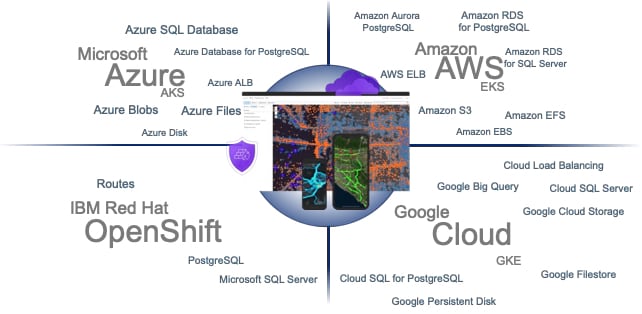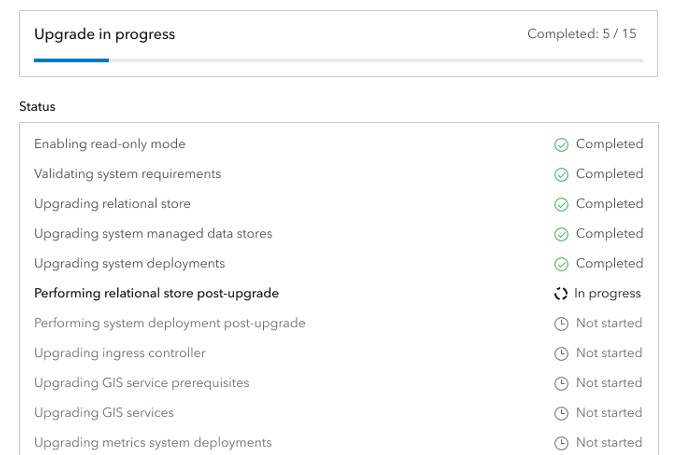More good news, everyone! As we shared recently, ArcGIS Enterprise 10.9.1, part of the ArcGIS 2021 Q4 release, is now available. We’re now excited to announce that the 10.9.1 release for ArcGIS Enterprise on Kubernetes is also available to eligible customers. Kubernetes brings the benefits of microservices and containerization, further described in What is ArcGIS Enterprise on Kubernetes?
Talk to your Esri representative about eligibility and whether ArcGIS Enterprise on Kubernetes might be right for you. Customers require an active enterprise agreement with Esri. To learn more, see Determine whether Kubernetes is right for you.
About ArcGIS Enterprise 10.9.1 on Kubernetes
This release marks the first time customers can perform a major upgrade to ArcGIS Enterprise on Kubernetes! Read more about the release in our product documentation. With this release comes substantial improvements to deployment, security and administration, backups, support for Google Kubernetes Engine, and continued progress toward including items that we had to defer from the initial release. Customers testing the process of upgrading have reported that they are pleased with its simplicity and speed.
ArcGIS Enterprise on Kubernetes will follow the same release cadence as for the Windows and Linux deployment options: that is, two per year. In addition, we will release interim updates on Kubernetes that improve administrative functionality or performance.
Below, read more about what’s included in the 10.9.1 release.
Deployment Improvements
Google Kubernetes Engine. We now support GKE, part of the Google Cloud. Esri continues to support Amazon EKS, Microsoft AKS and Red Hat OpenShift for running ArcGIS Enterprise on Kubernetes. We’re considering support in the future for additional Kubernetes environments such as Tanzu and Rancher. If this interests you, please talk with your Esri representative.
Self-managed container image registries. Some customers have requirements to use their own container image registry, rather than Esri’s privately managed repositories, to deploy or upgrade our software. Our deployment scripts facilitate this approach, and Esri will provide additional documentation and assistance if this requirement applies to you.
Password-Encrypt Utility Tool. We are now allowing for 256-bit Advanced Encryption Standard (AES-256) for passwords. This new tool is a script shipping with the product, as part of helping administrators to deploy or configure silently. This provides a significant improvement over Base-64 encoding.

Security and Enterprise Readiness Improvements
Web-tier authentication. We now support web adaptor capabilities that were deferred from the initial release on Kubernetes. This includes web-tier authentication, allowing for integrated Windows Authentication (IWA) and public key infrastructure (PKI). As before, you can configure logins to work with your internal systems with OpenID Connect and SAML-compliant identity providers. Read more here about security administration with ArcGIS Enterprise on Kubernetes.
Backup and restore. Administrators want to manage backup stores. We have built backup and restore workflows into ArcGIS Enterprise Manager. We are also adding the ability to schedule backups.
Administration Improvements
New Administrator APIs. Log entries are already visible and can be filtered in the ArcGIS Enterprise Manager interface. But with 10.9.1, users can search logs via the Administrator API, which helps with troubleshooting. You can submit an API call to search logs by keywords or phrases.
Improved upgrade and update process. We’re continuing to make the process more resilient to failures and able to self-recover in some cases. During an upgrade or update, the interface will provide more information about its progress.
…and more! We’re continuing to improve the administrator’s experience with enhanced messaging, management of asynchronous geoprocessing jobs, and much more. For example, at 10.9.1, you can mount NFS file shares directly from a container in a Kubernetes pod without requiring administration permission to the cluster nodes. Also at 10.9.1, usage statistics now supports image and geoprocessing services. We also added support to update the account used to connect to the container registry.

Capabilities Available
Along with these improvements, the software running on Kubernetes continues to move closer to what’s available when running on Windows and Linux. Below is a list of what is supported with ArcGIS Enterprise 10.9.1 on Kubernetes, along with items deferred to a later release. Be sure to review the product documentation for further details.
| Supported Environments | ||
| AWS Elastic Kubernetes Service (EKS)* | Available | |
| Microsoft Azure Kubernetes Service (AKS) | Available | |
| Google Kubernetes Engine (GKE) | Available | |
| Red Hat OpenShift Container Platform | Available | |
| Red Hat OpenShift running as a managed or dedicated service within the AWS, Azure, or Google Cloud environments is not supported. Please talk with your Esri representative about other environments you are interested in. | ||
| Deployment and Upgrading | ||
| Deploy an ArcGIS Enterprise organization in interactive or silent modes | Available | |
| Configure an ArcGIS Enterprise organization using a setup wizard or script | Available | |
| Upgrade or update the organization using ArcGIS Enterprise Manager or Administrator API | Available | |
| Support for self-managed container image registries | Available | |
| Select from several architecture profiles to optimize resources for high availability | Available | |
| Support multiple deployments in the same cluster | Available | |
| Support for fully disconnected environments | Deferred | |
| Administration | ||
| Monitor and search logs | Available | |
| Check health of system-managed stores | Available | |
| Monitor system and utility service pod status | Available | |
| Scale service and system deployments using ArcGIS Enterprise Manager or Administrator API | Available | |
| Create and administer web hooks | Available | |
| Obtain and view service usage statistics | Available | |
| Backup and restore the ArcGIS Enterprise organization using ArcGIS Enterprise Manager or Administrator API | Available | |
| Security | ||
| Configure SAML and OpenID Connect | Available | |
| Configure LDAP and Windows Active Directory | Available | |
| Configure enterprise groups and users | Available | |
| Configure web-tier authentication including IWA and PKI with ArcGIS Enterprise on Kubernetes Web Adaptor | Available | |
| Enable 256-bit AES for passwords | Available | |
| Data Management | ||
| Support for Amazon Redshift, Google BigQuery, and Snowflake cloud data warehouses | Available | |
| Register SQL Server and PostgreSQL as databases | Available | |
| Register your own data sources including folders and enterprise geodatabases | Available | |
| Add items that access storage locations in Google Cloud | Available | |
| Support for bulk publishing with an enterprise geodatabase | Available | |
| Support for distributed collaboration | Available | |
| Support for two-way editing with distributed collaboration | Available | |
| Support for Oracle or SAP HANA | Deferred | |
| Creating and Sharing Content | ||
| Publish map, feature, and geocode services | Available | |
| Publish map, tile, and scene tile packages | Available | |
| Publish hosted feature layers | Available | |
| Conduct spatial analysis | Available | |
| Publish from ArcGIS Pro 2.8 and higher | Available | |
| Consume services from ArcGIS Pro 2.7 and higher | Available | |
| Share routing services based on a network dataset | Available | |
| Share image services that reference large collections of imagery | Available | |
| Use web tools to share analysis across the organization | Available | |
| Publish scene services with associated feature layers | Deferred | |
| Support for ArcGIS Utility Network user type extension | Deferred | |
| Support for ArcGIS Parcel Fabric user type extension | Deferred | |
| Support for ArcGIS Workflow Manager user type extension | Deferred | |
| Server Federation Capabilities | ||
| Federate an ArcGIS GIS Server | Available | |
| Federate an ArcGIS Image Server (Raster Analytics functionality is deferred) | Available | |
| Federate an ArcGIS GeoAnalytics Server | Deferred | |
| Federate an ArcGIS GeoEvent Server | Deferred | |
| Federate an ArcGIS Notebook Server | Deferred | |
| Federate an ArcGIS Workflow Manager Server | Deferred | |
| Applications and Extensions | ||
| ArcGIS AppStudio | Available | |
| ArcGIS Collector | Available | |
| ArcGIS CityEngine | Available | |
| ArcGIS Dashboards | Available | |
| ArcGIS Drone2Map | Available | |
| ArcGIS Earth | Available | |
| ArcGIS Enterprise Sites | Available | |
| ArcGIS Experience Builder | Available | |
| ArcGIS Explorer | Available | |
| ArcGIS Field Maps | Available | |
| ArcGIS Instant Apps | Available | |
| ArcGIS for Office and ArcGIS for SharePoint | Available | |
| ArcGIS for Power BI | Available | |
| ArcGIS Navigator | Available | |
| ArcGIS QuickCapture | Available | |
| ArcGIS StoryMaps | Available | |
| ArcGIS Survey123 | Available | |
| ArcGIS Web AppBuilder | Available | |
| ArcGIS Workforce | Available | |
| Map Viewer | Available | |
| Scene Viewer | Available | |
| ArcGIS Business Analyst Enterprise | Deferred | |
| ArcGIS Data Interoperability Extension | Deferred | |
| ArcGIS Excalibur | Deferred | |
| ArcGIS Insights | Deferred | |
| ArcGIS Indoors and Space Planner | Deferred | |
| ArcGIS Mission | Deferred | |
| ArcGIS Solutions | Deferred | |
| ArcGIS Tracker | Deferred | |
| GeoAI Studio | Deferred | |
| Living Atlas | Deferred | |
| OrthoMaker | Deferred | |
| Parcel Fabric | Deferred | |
| Utility Network | Deferred | |
| Workflow Manager | Deferred |
Learn More
For more information about ArcGIS Enterprise 10.9.1 on Kubernetes, please speak with your Esri representative. Also check out answers to questions from the Esri User Conference 2021, and be sure to read our extensive product documentation.
Thanks for reading!


Commenting is not enabled for this article.